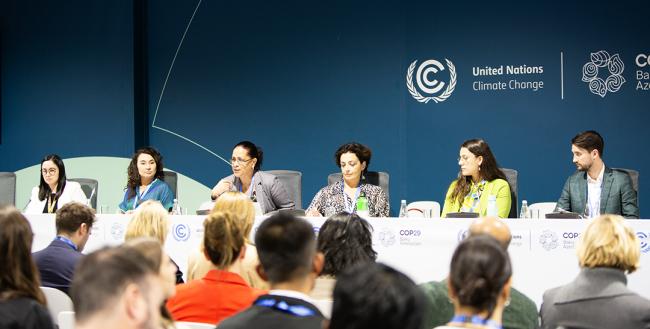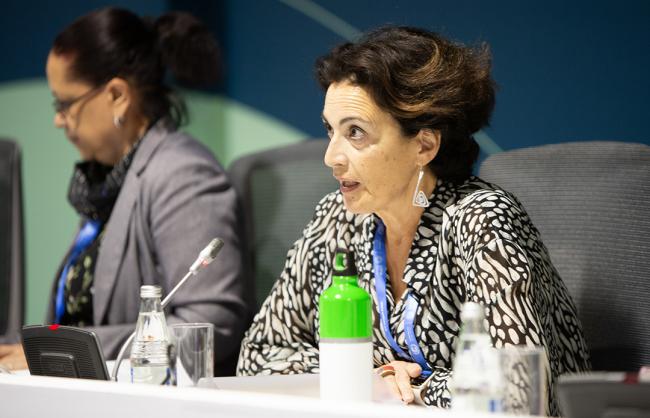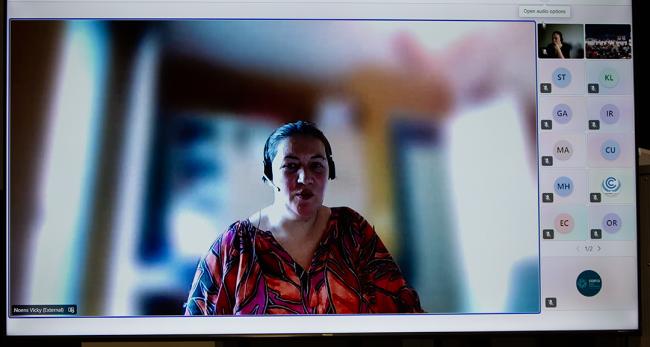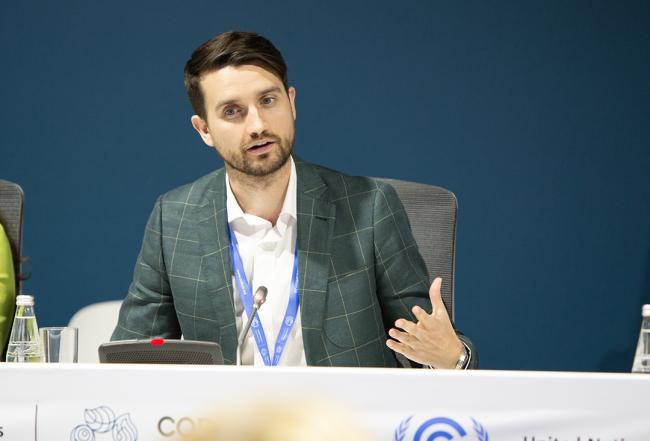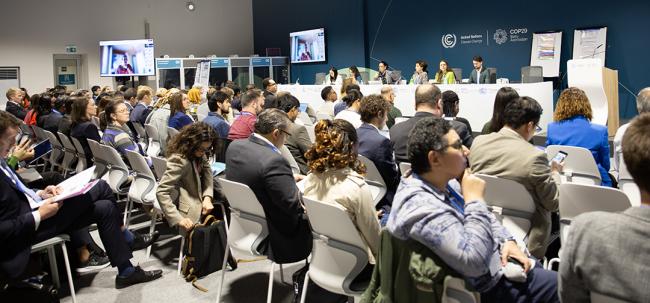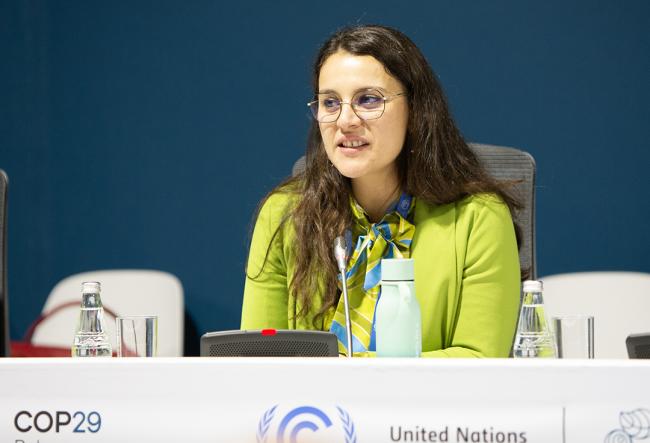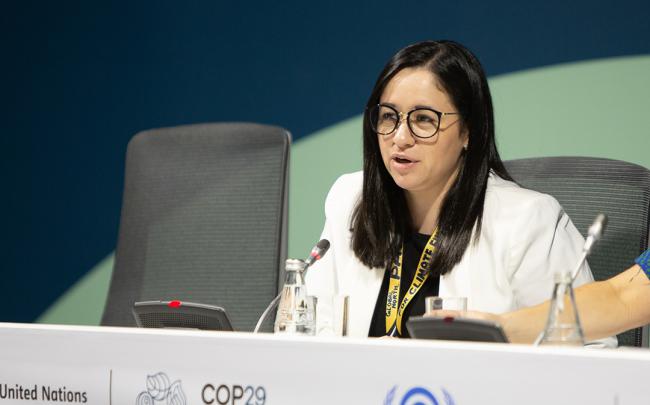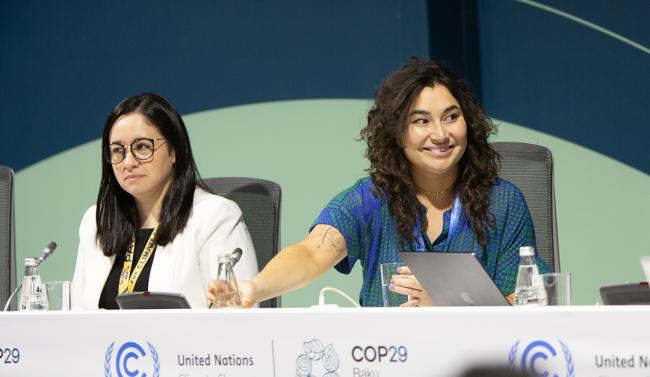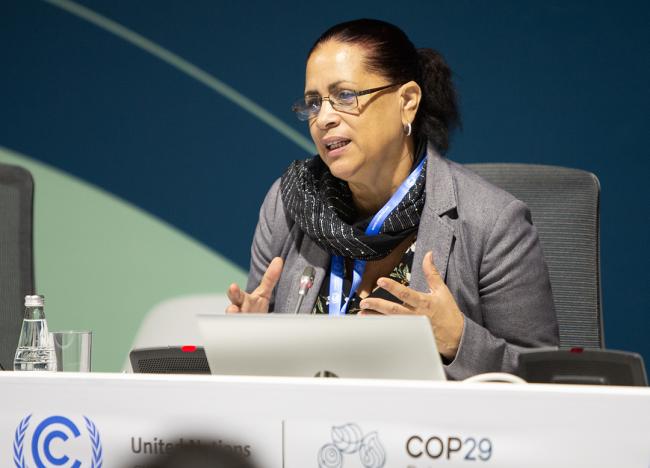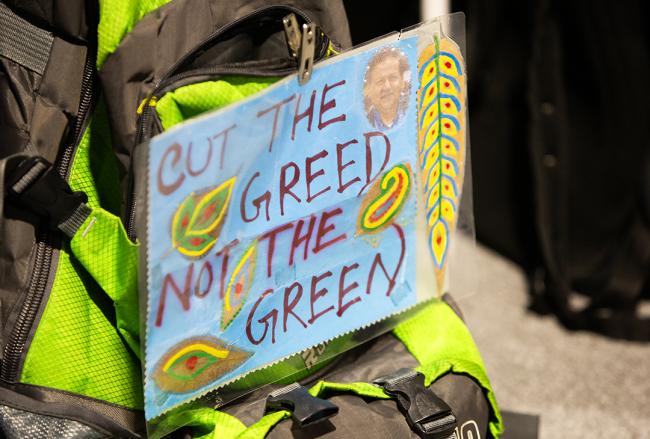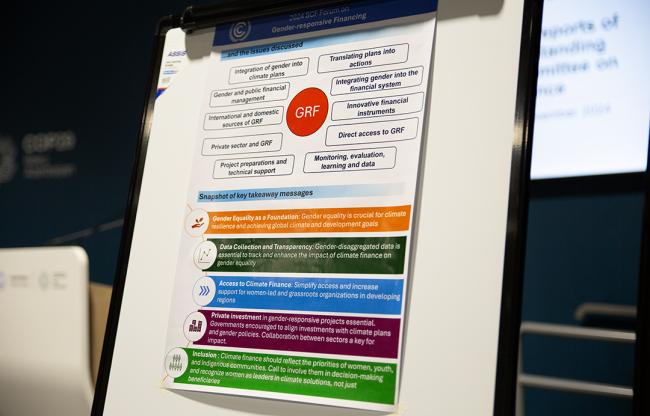About
Heralded as the “climate finance COP,” COP 29 puts the spotlight on the need to provide climate finance for developing countries to address the impact of climate change. This side event shed light on trends on climate finance flows, including the result of the USD 100 billion pledge, and best practices in climate finance.
This side event sought to provide a space for parties and observers to learn about the key findings of the Standing Committee on Finance (SCF) under the UN Framework Convention on Climate Change, and discuss them in an open and informal setting.
In her introductory remarks, Apollonia Miola, Co-Chair of the SCF, EU, outlined the agenda of the event, which was structured around presentations of findings from the following reports: a) Sixth Biennial Assessment and Overview of Climate Finance Flows (BA); b) Second report on the determination of the needs of developing country Parties related to implementing the Convention and the Paris Agreement (NDR); c) Second report on progress towards achieving the goal of mobilizing jointly USD100 billion per year to address the needs of developing countries in the context of meaningful mitigation actions and transparency on implementation (USD100 billion report); d) Report on common practices regarding climate finance definitions, reporting and accounting methods (Common Practices Report); and e) Summary report on the SCF Forum on accelerating climate action and resilience through gender-responsive financing (2024 Forum Report).
Vicky Noens, SCF member, Belgium, reported key findings from the BA report, which provides an overview of climate finance flows up until 2022. She highlighted the flow of climate finance from developed to developing countries, and particularly of grants which continue to be a key instrument for adaptation finance. She shared the following insights from the report:
- climate finance flows are shifting towards transition and implementation planning;
- the portfolio of climate finance for adaptation and resilience remains underexplored;
- the geographic scope of climate finance is expanding but is concentrated in certain regions;
- growing synergies between Paris Agreement Article 2.1 (c) (on making financial flows consistent with a pathway towards low emissions and climate-resilient development) and Article 9 (on developed country support to developing countries) are emerging;
- trends show the development of global cooperation and interoperability as well as context specific approaches; and
- there is progress in transparency, credibility, and real-economy impact.
Kevin Adams, SCF member, US, reported key findings from the NDR report. He gave an overview of needs identified by developing country parties for addressing climate change in accordance with the UNFCCC and the Paris Agreement. The report is based on reports submitted by them at the national, regional, and global levels. He emphasized that costed Nationally Determined Contribution (NDC) requirements by 98 parties total between USD 5036 to USD 6876 billion, which consist of incremental costs, investment needs, international or domestic costed needs, and conditional or unconditional costed needs. Adams said Asia reported the majority of the costed needs, while Africa reported the highest number of expressed needs. He also noted challenges and limitations faced in collecting data and information, including: the absence of standardized formats for reporting; gaps in processes and methodologies; and data not adequately capturing the scale of activities, as well as breadth and depth at the sectoral or thematic levels.
Gabriela Blatter, SCF member, Switzerland, presented the USD 100 billion report, welcoming the substantial growth in climate finance flows to developing countries between 2020-2022. She added that, according to data from 2022 from the Organisation for Economic Co-operation and Development (OECD) report Climate Finance Provided and Mobilised by Developing Countries, the threshold of USD 100 billion was achieved that year, one year ahead of when it was expected. She attributed this result to successful measures taken to increase public finance, as well as to the mobilization of private finance. She also discussed the challenges and limitations in gathering the data for the report due to, among others, the absence of a multilaterally-agreed accounting methodology to track progress.
Karima Oustadi, SCF member, Austria, reported on the Common Practices Report. She discussed key findings, including: a) an increase in reporting formats that include a bottom-up approach; b) climate providers and reporting organizations have developed their own reporting systems to track and report climate finance for different purposes; c) a greater variety of sectoral classifications and activity level and financial instrument information; and d) differing data aggregation methodologies. She also shared commonalities in methods for accounting climate finance flows, including the use of Rio markets and climate-specific shares and reporting on disbursement and information on “new and additional” finance.
Elena Cristina Pereira Colindres, SCF member, Honduras, and Brittany Young, SCF member, Australia, presented the 2024 Forum Report. The 2024 SCF Forum, they said, was held with the purpose of exchanging best practices and lessons learned in mobilizing and accessing gender-responsive financing for climate action and resilience. They shared key takeaway messages from the Forum, which include:
- gender inclusivity is key to climate action and resilience;
- there is a need to further integrate gender in climate finance;
- greater data and transparency are required to monitor developments in this area;
- climate finance for women has been enhanced; and
- stronger integration of gender responsiveness in the UNFCCC process is needed.
The Q&A session focused on ways to better track commitments and allocation of climate finance, as well as to further enhance the design of gender-responsiveness climate finance programmes. One participant also raised the importance of streamlining methodologies for reporting. Other speakers, however, noted the challenges of gathering data, and the lack of agreement on what makes for best practice.
Organizer: UNFCCC
Contact: Debapriya Roy | DRoy@unfccc.int
Website: https://unfccc.int/event/unfccc-key-reports-of-the-standing-committee-on-finance-for-cop-29
To receive free coverage of global environmental events delivered to your inbox, subscribe to the ENB Update newsletter.
All ENB photos are free to use with attribution. For 2024 UN Climate Change Conference Baku - Side Events , please use: Photo by IISD/ENB | Angeles Estrada Vigil

